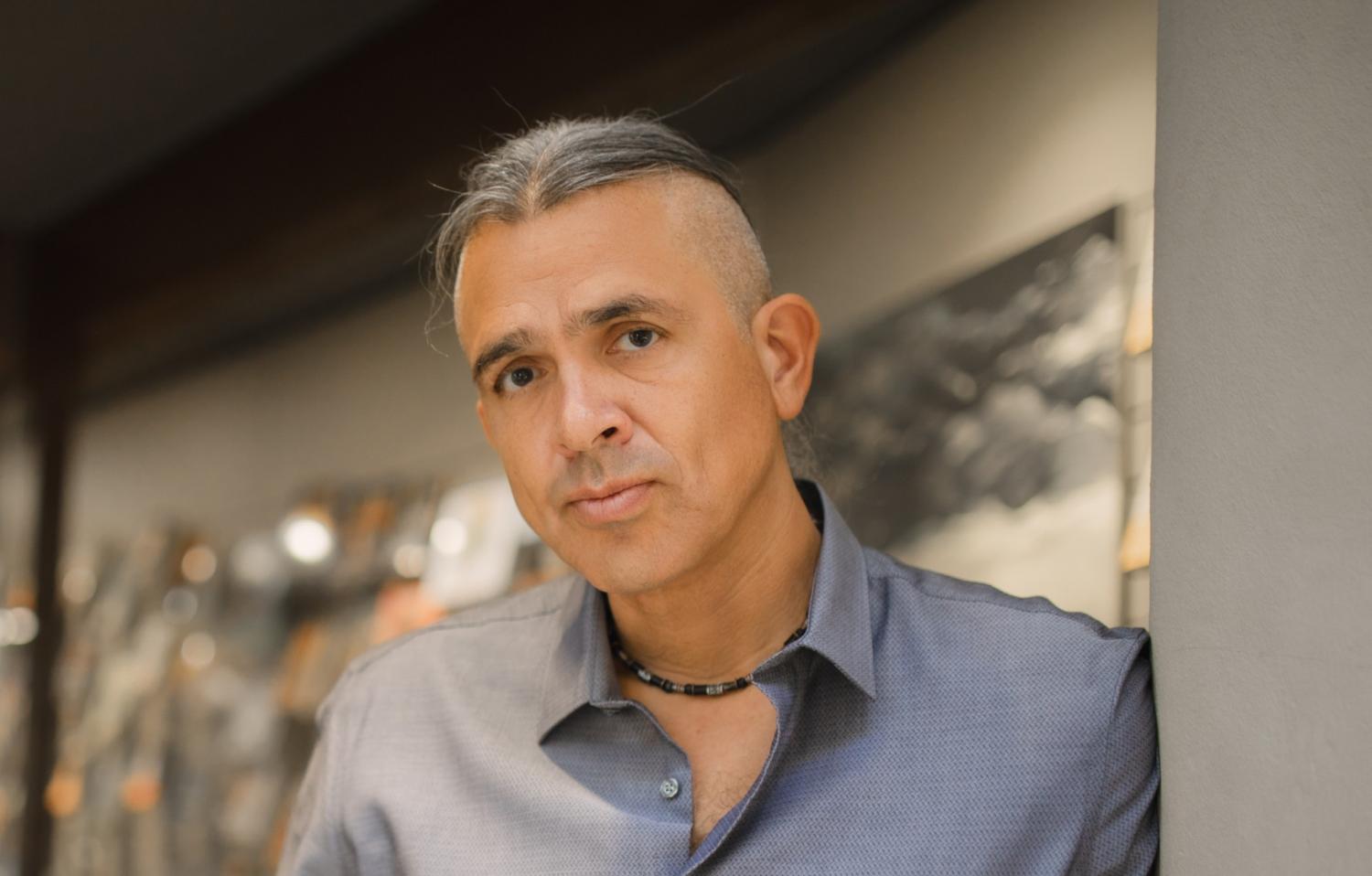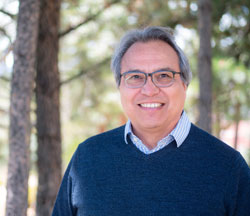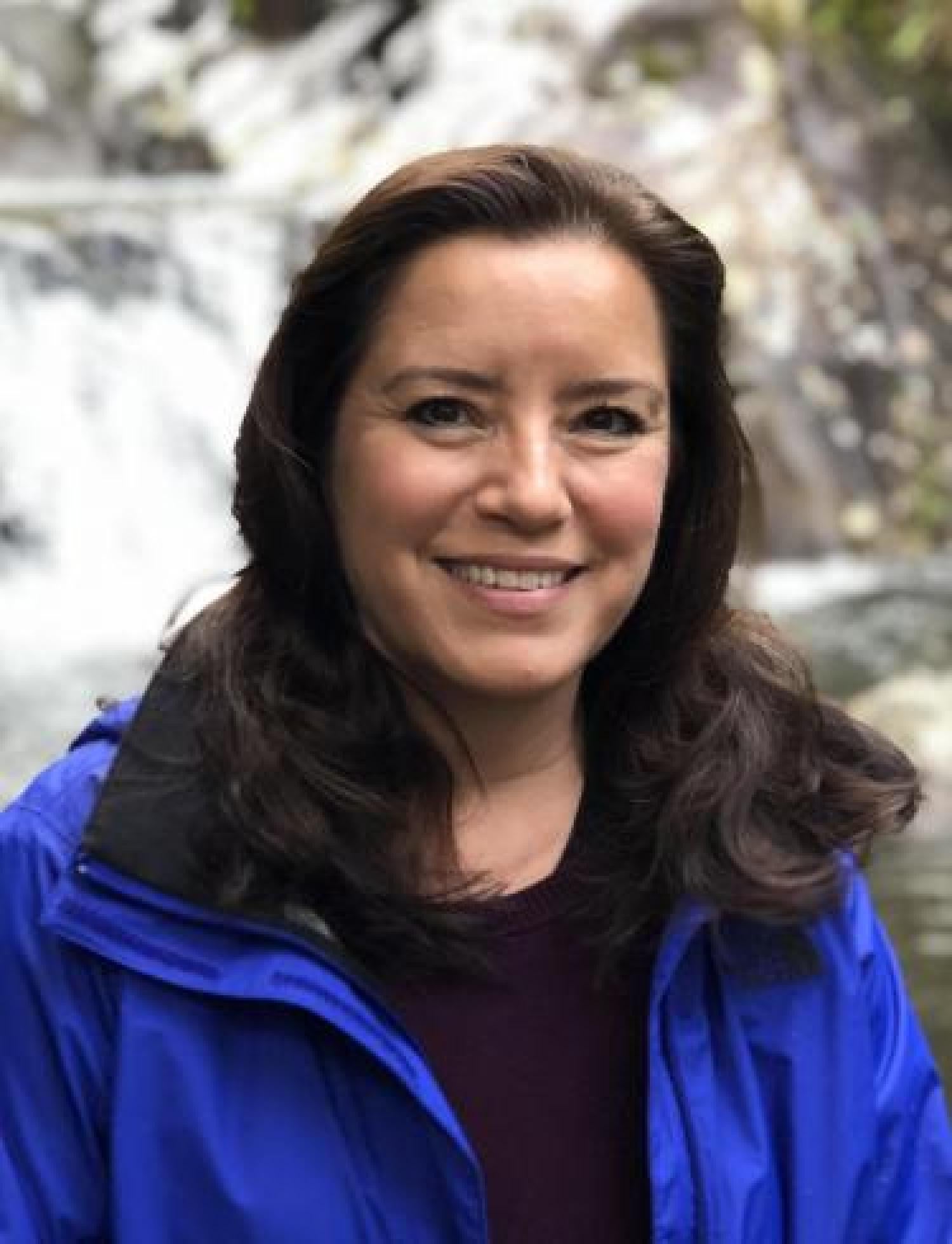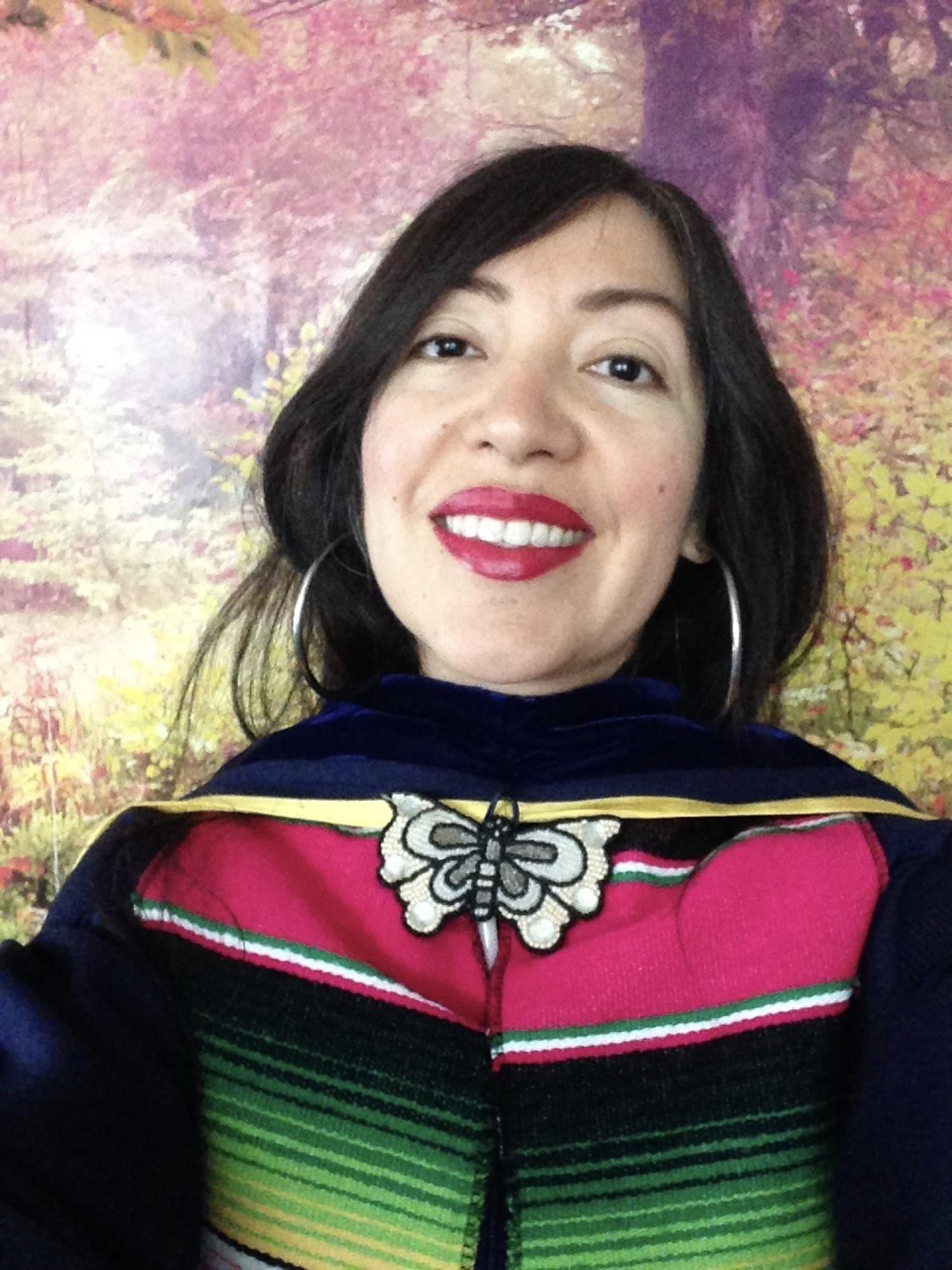
Stephen Graham Jones is a Professor of Distinction, and the Ineva Reilly Baldwin Endowed Chair in the English Department at CU Boulder. Jones is the NYT bestselling author of nearly thirty-five novels and collections, and there’s some novellas and comic books in there as well. He has been an NEA recipient, has won the Texas Institute of Letters Award for Fiction, the Los Angeles Times Ray Bradbury Prize, the Mark Twain American Voice in Literature Award, the August Derleth British Fantasy Award for Best Horror Novel, the Independent Publishers Award for Multicultural Fiction, the Western Literature Association’s Distinguished Achievement Award, the American Library Association’s RUSA Award and Alex Award, the 2023 American Indian Festival of Words Writers Award, the Locus Award, four Bram Stoker Awards, three Shirley Jackson Awards, and six This is Horror Awards. Stephen’s also been inducted into the Texas Literary Hall of Fame, he’s been a finalist for the World Fantasy Award and the Eisner Award, and he’s made Bloody Disgusting’s Top Ten Horror Novels. He’s the guy who wrote Mongrels, The Only Good Indians, The Indian Lake trilogy, the comic book Earthdivers, I Was a Teenage Slasher, and The Buffalo Hunter Hunter.

Clint Carroll is Associate Professor of Ethnic Studies at the University of Colorado Boulder. He received his doctorate from the University of California Berkeley in Environmental Science, Policy, and Management, and his bachelor’s degree from the University of Arizona in Anthropology, with a minor in American Indian Studies. A citizen of the Cherokee Nation, he works closely with Cherokee people in Oklahoma on issues of land conservation and the perpetuation of land-based knowledge and ways of life. His book, Roots of Our Renewal: Ethnobotany and Cherokee Environmental Governance (2015, University of Minnesota Press), explores how tribal natural resource managers navigate the material and structural conditions of settler colonialism, as well as how recent efforts in cultural revitalization are informing such practices through traditional forms of decision-making and local environmental knowledge.

S. James Anaya is a Distinguished Professor and Nicholas Doman Professor of International Law at the CU Law School. Anaya has taught and written extensively on international human rights and issues concerning Indigenous peoples. He has advised numerous Indigenous and other organizations from several countries on matters of human rights and Indigenous peoples, and he has represented Indigenous groups from many parts of North and Central America in landmark cases before domestic and international tribunals, including the United States Supreme Court and the Inter-American Court of Human Rights.

Angelica Lawson (Northern Arapaho) is Assistant Professor of Film Studies and Ethnic Studies. Her work seeks to examine the intersections of national and transnational trends in Indigenous film and media. To this end, she has worked with Indigenous scholars, artists, and filmmakers from the United States, Aotearoa / New Zealand, Norway, and Finland.

Natalie Avalos is an Assistant Professor in the Department of Ethnic Studies and Affiliate Faculty in the Religious Studies and Women and Gender Studies Departments. Avalos is an ethnographer of religion whose research and teaching focus on comparative Indigeneities, urban Indian and Tibetan refugee religious life, decolonial praxis, and healing historical trauma. She is a Chicana of Mexican Indigenous descent, born and raised in the Bay Area.
There are many definitions of Indigenous Knowledge, sometimes called Traditional Knowledge. Here are two:
Researchers that only use academic markers of authority (peer review, academic credentials, etc.) to evaluate information will find a one-sided perspective because academic sources are most often written about Indigenous communities rather than by them. Reliance on academic authority effectively silences many of the voices of Indigenous people on their own culture. Under this colonialist construction of knowledge, interpretation of Indigenous cultures is denied to members of that culture and reserved for those with academic authority. As Linda Tuhiwai Smith so searingly recounts in the introduction to her book, the Western monopoly on interpretation is incredibly painful to Indigenous cultures:
"It galls us that Western researchers and intellectuals can assume to know all that is possible to know of us... It appalls us that the West can desire, extract, and claim ownership of our ways of knowing, our imagery, the things we create and produce, and then simultaneously reject the people who created and developed those ideas...” (Tuhiwai Smith, 2012)
Western systems of knowledge appropriate and at the same time devalue information created by Indigenous ways of knowing. When working with Indigenous Knowledge in an academic context, it is vital to respect the authority, agency, and voice of Indigenous Knowledge. Do not treat Indigenous authorities as mere "informants," but rather as equals in the knowledge creation process.
Indigenous Knowledge systems are diverse and multifarious, though they often share practices based on long histories of accumulated experiences with the world. The particulars and specifics of this knowledge are related to the whole as Native knowledge is often holistic and interrelated (Barnhardt and Kawagley, 2005). This knowledge is passed on through stories, demonstrations, and trial. Mastery depends on practical application of knowledge and indeed is tested through everyday survival:
“Knowledge is something you do; not a pre-existing tool independent of the person holding it, nor of the uses it might be put.” (Doxtator, 1996)
Western knowledge is typically compartmentalized, taught in detached and decontextualized settings, and indirectly measured with tests rather than judged based on one’s ability to put that knowledge into practice.
In traditional Native knowledge systems there is respect and trust for inherited wisdom, often communicated through an oral tradition, and for knowledge that has proved its utility in everyday practices. There is respect for stories that connect the particulars of knowledge to holistic worldviews, values, and life ways. Knowledge is often collective, evolving in a community of users, knowers, and actors. Authority is not conferred via systematic processes of Western bureaucracy, but rather through community decision making and respect for the knowledge and authority of elders (Barnhardt and Kawagley, 2005).
Used with permission from Stephens, Sidney. Handbook for Culturally Responsive Science Curriculum. Alaska Science Consortium and the Alaska Rural Systemic Initiative, 2000.
Modes of Indigenous scholarship, criticism of ethnographic methods, and issues in western knowledge organization systems that categorize Indigenous Knowledge. As Vine Deloria states:
"In an epistemological sense, there is no question that the tribal method of gathering information is more sophisticated and certainly more comprehensive than Western science. In most tribal traditions, no data are discarded as unimportant or irrelevant. Indians consider their own individual experiences, the accumulated wisdom of the community that has been gathered by previous generations, their dreams, visions, and prophecies, and any information received from birds, animals, and plants as data that must be arranged, evaluated, and understood as a unified body of knowledge." (Deloria, 2011)
Moreover, field research often reflects the colonial history of research on Indigenous peoples, and with it painful memories. There are extremely problematic dynamics that come into play when researchers go to indigenous people for answers. Linda Tuhiwai Smith lays out the connection of research to colonialism and imperialism, and the pain and hurt research has caused and continues to cause indigenous peoples. To ameliorate this painful dynamic, it is vital to ensure that research empowers Native voices rather than exploits them. Native ideas should not be treated as raw materials needing packaging and analysis by Western scholars before they constitute authoritative knowledge, but as inherently authoritative. One important notion for researchers seeking indigenous voices is the idea of “reporting back,” that there should be information reciprocity, cooperation, and mutual benefit.
"Research was talked about both in terms of its absolute worthlessness to us... and its absolute usefulness to those who wielded it... It told us things already known, suggested things that would not work, and made careers for the people who already had jobs." (Tuhiwai-Smith)
Indigenous Knowledge has often been misappropriated and misinterpreted by scientists and academics. Examples of the misappropriation of Indigenous Knowledge include:
Biopiracy - the appropriation of Indigenous knowledge of plants and natural resources by non-Indigenous scientists or for-profit companies, especially the pharmaceutical industry
Appropriation of symbols or art - this story explains the Indigenous origin of New Mexico’s state flag, a sacred symbol created by the Zia people, and shared by a non-Indigenous anthropologist without Zia consent or compensating the Zia. The Zia ask that permission be requested to use the symbol and that those using the symbol contribute to a scholarship fund for Zia children.
Appropriation of sacred land for research purposes - the summit of Maunakea on the big island of Hawai'i is sacred to the Hawaiian nation. It is also the site of 13 astronomy telescopes and the proposed location of a thirty-meter telescope, against the wishes and informed consent of Indigenous peoples. Native scientists advocate the creation of a Cultural Impact Assessment process and emphasize the need for historical context in STEM, with an awareness of the costs of research on marginalized communities that prioritizes the agency and decision-making of Indigenous groups.
Library classification systems, such as the Dewey Decimal System and the Library of Congress Subject Headings, which CU Boulder Libraries and many other academic libraries use, reflect Western colonial systems of sorting information rather than Indigenous methods, ontologies, or epistemologies.
As this article on the X̱wi7x̱wa Library at the University of British Columbia explains, there are many issues with the two most commonly used library classification systems:
Subject headings sort Native topics into the history section, implying that Indigenous people are historical artifacts and do not have a living culture -- or are literally living people.
Additionally, this fantastic slideshow on Decolonizing Cataloging and Classification by Kalani Adolpho, Diversity Resident Librarian at University of Wisconsin Madison, identifies further issues with commonly used library classification systems:
There are, however, efforts to redress the harmful mishandling of Indigenous Knowledge by libraries, via the creation of subject headings, labels and classification systems created by Indigenous communities, that reflect Indigenous knowledge organization. Some examples of these projects, and this is by no means an exhaustive list, include:
Suggested Resource:
The X̱wi7x̱wa Library’s excellent LibGuide on Indigenous Knowledge Organization links to several initiatives and has an excellent bibliography of further readings written by Indigenous library scholars.
It is important to recognize that Indigenous voices can come from many places, especially the all-too-common exclusion of Western-educated natives because they are not considered to be writing from an “authentic” Indigenous perspective. However, an increasingly connected world is offering opportunities for Indigenous scholars to network across communities and center their voices in academic publishing.
Below are several resources for several Indigenous-led and focused academic organizations and scholarly endeavors.
